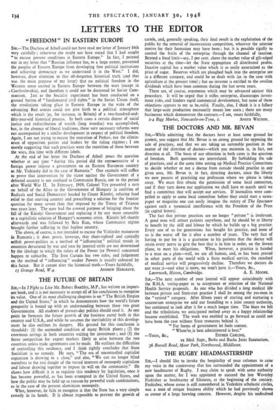LETTERS TO THE EDITOR
FREEDOM " IN EASTERN EUROPE
Sit,—The Duchess of Atholl could not have read my letter of January 16th very carefully ; otherwise she might not have stated that I had sought " to excuse present conditions in Eastern Europe." In fact, I pointed out in my letter that "Russian influence has, to a large extent, prevented the peoples of Eastern Europe from developing free political institutions and achieving democracy as we understand it in the West." I did, however, draw attention to that oft-forgotten historical truth (and that was the main purpose of my letter) that no political freedom in the Western sense existed in Eastern Europe between the wars (except in . Czechoslovakia), and therefore it could not be destroyed by Soviet Corn- monism. Just as the Socialist experiment has been conducted on a ground barren of " fundamental civil rights " in the Soviet Union itself, the revolutions taking place in Eastern Europe in the wake of the advancing Red armies could not give birth to a political atmosphere which is the result (as, for instance, in Britain) of a two-hundred-and- fifty-year-old historical process. In both cases a certain degree of social justice and redistribution of wealth (long overdue) was accomplished, but, in the absence of liberal traditions, these very necessary reforms were not accompanied by a similar development in respect of political freedom. Again, I am not trying to excuse the execution of Petkov, nor the elimin- ation of opposition parties and leaders by the ruling regimes ; I am merely suggesting that such practices were the repetition of those between the wars, this time with different labels.
At the end of her letter the Duchess of Atholl poses the question whether at any time " during this period did the' representative of a foreign power impose a government on an Eastern European country as Mr. Vishinsky did in the case of Rumania." One example will suffice to prove that intervention by the victor against the Government of a defeated country is not confined to Communist Russia, nor to the period after World War II. In February, 1919, Colonel Vyx presented a note on behalf of the Allies to the Government of Hungary (a coalition of Radicals and Social Democrats) headed by Count Kirolyi, refusing food relief to that starving country and prescribing a solution for the frontier question far more severe than that imposed by the Treaty of Trianon two years later. The note had the avowed purpose of bringing about the fall of the Karolyi Government and replacing it by one more amenable to a capitalistic solution of Hungary's economic crisis. Kirolyi fell shortly afterwards and was followed by Bela Kun, whose Communist regime brought further suffering to that haplesi country.
The above, of course, is not intended to excuse the Vishinsky manoeuvre in Rumania ; it does prove, however, that short-sighted and cynically .elfish power-politics as a method of "influencing" political trends in countries devastated by war and torn by internal strife are not determined by the ideology to which the rulers of the Power (or Powers) concerned happen to subscribe. The Iron Curtain has two sides, and judgement on the method of " influencing " weaker Powers is usually coloured by this factor. But it cannot alter the historical truth.—Yours faithfully,


































 Previous page
Previous page